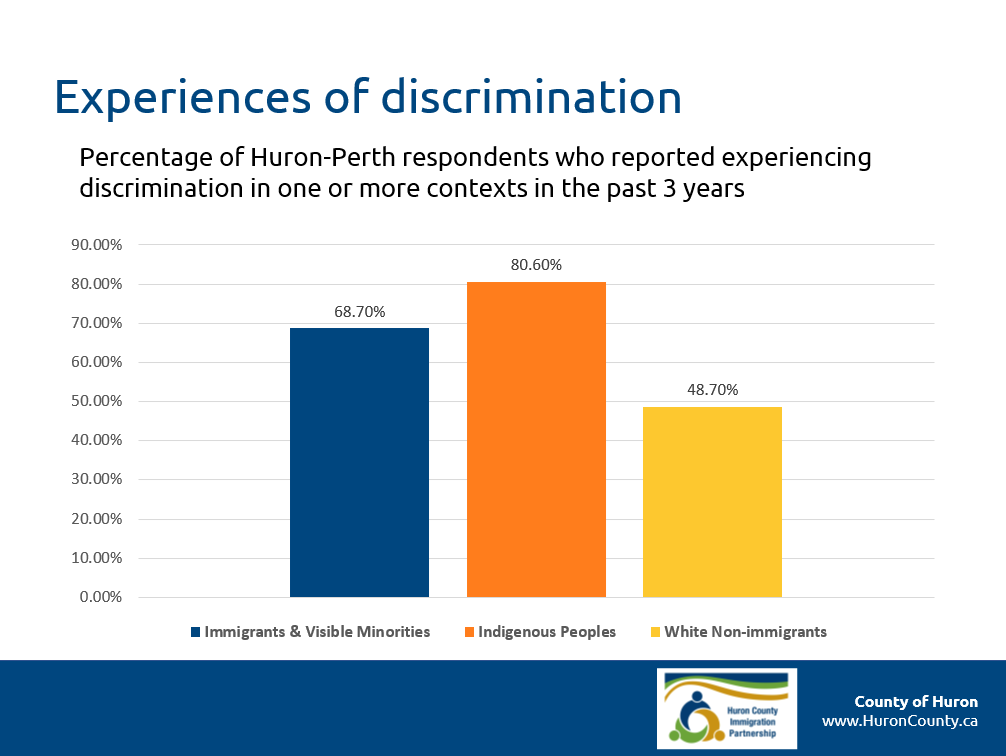A vast majority of Huron-Perth residents who identify as being an immigrant, a visible minority, or an Indigenous person say they have been subject to discrimination in the last three years, according to a new research paper released Wednesday by the county.

The paper details the findings of a study conducted this past spring by a team of researchers at Western University, in coordination with Huron County Immigration Partnership and Forum Research Inc, which sought to investigate the issue of discrimination in the Huron-Perth region.
Thousands of Huron-Perth residents were randomly called as part of the study, with 595 taking part, including 297 who identified as a visible minority or immigrant, 236 who identified as a white non-immigrant, and 62 who identified as Indigenous.
Of those who identified as Indigenous, the researchers found that nearly 81 per cent, or eight in 10, reported experiencing discrimination in one or more contexts within the last three years, while 68.7 per cent of those identifying as an immigrant or visible minority said the same. For white non-immigrants, the percentage was 48.7.
“Immigrants & visible minorities and indigenous peoples perceived their experiences of discrimination as based on ethnocultural factors related to different minority group statuses (e.g., race or skin colour, indigenous identity, ethnicity or culture),” the report states.
“In the immigrants & visible minorities group, status as an immigrant was also mentioned. In contrast, comparison white non-immigrants tended to perceive their experiences of discrimination as based on more universal factors (e.g., gender, age, physical appearance).”
All three groups reported that the perpetrators of the discrimination were most likely to be middle aged and white, however nearly 35 per cent of participants who identified as Indigenous reported that perpetrators often included other Indigenous peoples, the report states.
Nearly 69 per cent of participants identifying as Indigenous said derogatory language was the most prevalent form of discrimination they faced, followed by verbal abuse and inappropriate jokes with 56.3 per cent each.
Those who identified as an immigrant or visible minority reported inappropriate jokes to be the most prevalent form of discrimination with 68.4 per cent, followed by derogatory language with 53.2.
For participants identifying as white non-immigrant, inappropriate jokes were listed as being the most prevalent form of discrimination at 63.8 per cent, followed by derogatory language at 48.6.
“On average, Indigenous peoples reported experiencing discrimination in more contexts than Immigrants & Visible Minorities and White Non-immigrants,” the report states.
“In both the Immigrants & Visible Minorities group and the Indigenous peoples group, contexts for discrimination that were most frequently indicated included while using public areas, such as parks and sidewalks, at their job, when attending school or classes, and in a store, bank or restaurant.”
Respondents in all three groups, on average, reported experiencing anxiety and depression as a result of their discrimination experiences, the report says.
Participants identifying as Indigenous, however, “tended to experience more negative emotions and psychological distress than respondents in the other two groups,” the researchers found.
In a statement, Glen McNeil, the warden for Huron County, said county officials were committed to addressing the issue of discrimination.
“This report on discrimination in Huron and Perth provides the County with a tool to self-reflect. With it, we can acknowledge privilege, seek better understanding, and make positive changes to create a more inclusive community where everyone feels that they belong,” McNeil said.
Jim Aitcheson, the warden for Perth County, concurred, saying in a statement that the study’s findings demonstrate that those experiencing discrimination are less likely to feel accepted by the community.
“As we consider issues such as labour shortages, we need to think about strategies that make our communities and workplaces as inclusive and welcoming as possible,” Aitcheson said.
The report makes three key recommendations, including that county officials develop a mechanism that would allow those experiencing discrimination to report it.
The study notes that many incidents are not reported for a variety of reasons, including a lack of trust in the system, and a lack of clarity as to whom one should report such incidents.
Other recommendations include “supporting victims of discrimination to access appropriate mental health support,” and “creating anti-discrimination strategies that addresses discrimination in places where it frequently occurs, the forms it is most often relayed, and to the people who most frequently perpetuate it,” a summary published by Huron County states.
The full report can be read here.








Comments